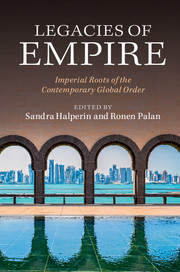Book contents
- Frontmatter
- Contents
- List of figures
- List of tables
- List of contributors
- Acknowledgments
- 1 Introduction: legacies of empire
- Part I Incomplete transitions from empires to nation states
- Part II Legacies of non-European empires in today's world
- Part III The future legacies of the American Empire
- 8 Foreign bases, sovereignty and nation building after empire: the United States in comparative perspective
- 9 Empire, capital and a legacy of endogenous multiculturalism
- 10 The assemblage of American imperium: hybrid power, world war and world government(ality) in the twenty-first century
- 11 Conclusions
- Index
- References
9 - Empire, capital and a legacy of endogenous multiculturalism
from Part III - The future legacies of the American Empire
Published online by Cambridge University Press: 05 August 2015
- Frontmatter
- Contents
- List of figures
- List of tables
- List of contributors
- Acknowledgments
- 1 Introduction: legacies of empire
- Part I Incomplete transitions from empires to nation states
- Part II Legacies of non-European empires in today's world
- Part III The future legacies of the American Empire
- 8 Foreign bases, sovereignty and nation building after empire: the United States in comparative perspective
- 9 Empire, capital and a legacy of endogenous multiculturalism
- 10 The assemblage of American imperium: hybrid power, world war and world government(ality) in the twenty-first century
- 11 Conclusions
- Index
- References
Summary
Empire, capital and endogenous multiculturalism
Do empire and capitalism produce different kinds of multiculturalism? And how did empire and capitalism interact to produce the multicultural societies we see every where today? Imperial and capitalist multiculturalism do differ, but not as much as one might expect, and not just because modern capitalist society emerged out of several imperial powers. It is tempting to see today's multiculturalism as a lingering feature of capitalism's impure origins in the world that preceded it. But both empire and capitalism contain contradictory and endogenous tendencies towards homogenization and differentiation that grow out of generic political and economic logics. Homogenization and differentiation each lower both governance costs and transaction costs in the mobilization of labour forces. The precise mix differs from place to place, as a function of the imperial centre's relative strength, population density in newly conquered territory and the onset of industrialization.
I tease out some of these differences by comparing labour mobilization and migration in late Qing China, the British tropical empire before and after the industrial revolution and the US Empire. Thirty million people migrated from Han China into Manchuria in the nineteenth century. This came close to producing the same kind of culturally homogeneous population and production practices that existed on the south side of the Great Wall.
- Type
- Chapter
- Information
- Legacies of EmpireImperial Roots of the Contemporary Global Order, pp. 197 - 220Publisher: Cambridge University PressPrint publication year: 2015
References
- 2
- Cited by



